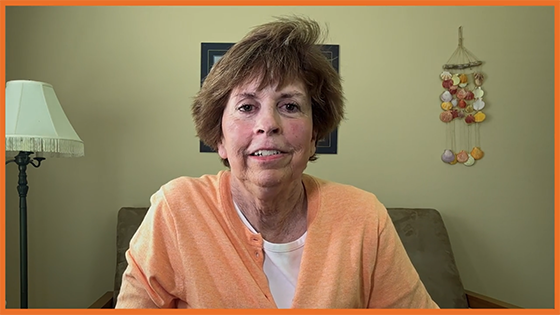My name is Suzy; I live in South Carolina. I started MAVENCLAD in 2021 and finished the second course in 2022. Before I was diagnosed with relapsing MS, I lived a very active lifestyle, and for most of this earlier experience, I did have MS symptoms like numbness and tingling, but they were often confused with my athletic injuries. So, once I was officially diagnosed, my general neurologist did prescribe one of the earlier oral MS therapies. I started taking that while I was waiting to get approval for an infusion therapy. So, eventually, the infusion therapy was approved, so I went on that. But as I stayed on that therapy for about two and a half years, I felt like…it just felt like my MS was not in control, and I didn’t have anybody really monitoring that. So, I started searching outside of my area to find an MS specialist who was willing to really look at my MS and be sort of an advocate for my MS disease. I did find a neurologist and she seemed to take my MS seriously, seemed to take my age, took my lifestyle, everything else, and we began talking about a plan. Since my neurologist knew that I was concerned about my immune system being continuously weakened, she explained that MAVENCLAD was an option, and rather than continuously suppressing my immune system, it's thought to work by depleting my lymphocytes, and then allowing them to recover over several months. After my immune system begins to recover, hopefully without the cells that play a role in MS, it can fight infections and begin functioning normally again, which is what I was certainly searching for. Certainly, as I am aging, I was concerned about staying on any MS therapy, and certainly I was concerned about my immune system being depleted further. She did explain that MAVENCLAD is an oral tablet, and I was interested in the convenient dosing schedule. My doctor talked to me about the possible serious side effects including risk of cancer, birth defects, low white blood cell counts, serious infections, and liver problems. I do have a history of skin cancers, basal cell carcinomas. So, before I started MAVENCLAD, my neurologist and I did have a discussion about that, and I had talked extensively with my dermatologist as well. She also told me I’d be monitored before, during, and after treatment. So, at that point we decided to give MAVENCLAD a try. I guess one of the huge advantages is I am not going for infusion treatments any longer. I don’t have to worry about premedicating beforehand. Since completing MAVENCLAD, I feel like my MS is much more stable. I haven’t had any relapses. I feel like my mobility continues to improve, and I hope to continue along that trajectory. And now this is my experience and yours may be different. Since I’ve been diagnosed, I have had to curtail some of my activities, and I have had to slow down, but I’ve learned how to modify some of the exercise that I do, and figured out no pain, no gain is not necessarily my motto so…I think one of the other areas that’s really important is to connect with others. In my area, there is not a lot of MS support, so I’ve learned to seek out connection online. I feel like I ignored my own symptoms for so long and realized that that is not necessarily the way to go. So, in talking with others, I encourage them to advocate for themselves, to pay attention to their own bodies and work at getting that earlier diagnosis. And so now I have grandchildren that I’m able to watch and I love at least being able to get out and be with them. And so, I may not be running marathons with them, but I can be cheering them across the finish line.
MAVENCLAD (cladribine) tablets
Indication and Important Safety Information
WHAT IS MAVENCLAD?
MAVENCLAD is a prescription medicine used to treat relapsing forms of multiple sclerosis (MS), to include relapsing-remitting disease and active secondary progressive disease, in adults. Because of its safety profile, MAVENCLAD is generally used in people who have tried another MS medicine that they could not tolerate or that has not worked well enough.
MAVENCLAD is not recommended for use in people with clinically isolated syndrome (CIS). It is not known if MAVENCLAD is safe and effective in children under 18 years of age and is therefore not recommended.
MAVENCLAD may cause serious side effects, including:
· Risk of cancer (malignancies). You should follow healthcare provider instructions about screening for cancer.
· MAVENCLAD may cause birth defects if used during pregnancy. Women must not be pregnant when they start treatment with MAVENCLAD or become pregnant during MAVENCLAD dosing and within 6 months after the last dose of each yearly treatment course. You should stop treatment with MAVENCLAD and contact your healthcare provider right away if you become pregnant during treatment with MAVENCLAD.
o For women who are able to become pregnant:
§ Your healthcare provider should order a pregnancy test before you begin your first and second yearly treatment course of MAVENCLAD to make sure that you are not pregnant.
o Ask your healthcare provider which contraceptive method is right for you. Women and men being treated with MAVENCLAD should use effective birth control (contraception) on the days on which they take MAVENCLAD and for at least 6 months after the last dose of each yearly treatment course.
Do not take MAVENCLAD if you:
· have cancer (malignancy).
· are pregnant, plan to become pregnant, or are a woman of childbearing age or a man able to father a child and you are not using birth control.
· are breastfeeding.
· are human immunodeficiency virus (HIV) positive.
· have active infections, including tuberculosis (TB), hepatitis B or C.
· are allergic to cladribine.
Before you take MAVENCLAD, tell your healthcare provider about all of your medical conditions, including if you:
· think you have an infection.
· have taken, take, or plan to take medicines that affect your immune system or blood cells, or other treatments for MS. Certain medicines can increase your risk of getting an infection.
· have had a recent vaccination or are scheduled to receive any vaccinations. You should not receive live or live-attenuated vaccines within the 4 to 6 weeks preceding treatment with MAVENCLAD or receive these types of vaccines during your treatment with MAVENCLAD and unless directed by your healthcare provider.
· have heart failure.
· have or have had cancer.
· have liver or kidney problems.
· are breastfeeding or plan to breastfeed. It is not known if MAVENCLAD passes into your breast milk. Do not breastfeed on the days on which you take MAVENCLAD, and for 10 days after the last dose.
How should I take MAVENCLAD?
· MAVENCLAD is given as two yearly treatment courses, consisting of 2 treatment weeks (cycles) about a month apart.
· Handle MAVENCLAD with dry hands and take immediately after opening the blister pack. Take with water and do not chew the tablet. MAVENCLAD can be taken with or without food and should be taken at least 3 hours apart from other medicines.
· Wash your hands after handling MAVENCLAD. Limit contact with your skin (especially on your face). Wash skin and surfaces with water if contact occurs.
· If you miss a dose, take it as soon as you remember on the same day. If the whole day passes before you remember, take your missed dose the next day. Do not take 2 doses at the same time. Instead, you will extend the number of days in that treatment week.
Your healthcare provider will continue to monitor your health during the 2 yearly treatment courses, and for at least another 2 years during which you do not need to take MAVENCLAD. It is not known if MAVENCLAD is safe and effective in people who restart MAVENCLAD treatment more than 2 years after completing 2 yearly treatment courses.
Your healthcare provider will continue to monitor your health during the 2 yearly treatment courses, and for at least another 2 years during which you do not need to take MAVENCLAD. It is not known if MAVENCLAD is safe and effective in people who restart MAVENCLAD treatment more than 2 years after completing 2 yearly treatment courses.
MAVENCLAD can cause serious side effects. If you have any of these symptoms listed below, call your healthcare provider right away:
· low blood cell counts have happened and can increase your risk of infections during treatment with MAVENCLAD. Blood tests are needed before you start treatment with MAVENCLAD, during your treatment with MAVENCLAD, and afterward, as needed.
· serious infections such as:
o life-threatening or fatal infections caused by bacteria, viruses, parasites or fungi.
o TB, hepatitis B or C, and shingles (herpes zoster). Fatal cases of TB and hepatitis have happened with cladribine during clinical studies. Tell your healthcare provider right away if you get any symptoms of the following infection related problems or if any of the symptoms get worse, including fever, aching painful muscles, headache, feeling of being generally unwell, loss of appetite, burning, tingling, numbness or itchiness of the skin in the affected area, skin blotches, blistered rash, or severe pain.
o progressive multifocal leukoencephalopathy (PML). PML is a rare brain infection that usually leads to death or severe disability. Although PML has not been seen in MS patients taking MAVENCLAD, it may happen in people with weakened immune systems. Tell your healthcare provider right away if you have any new or worsening neurologic signs or symptoms. These may include: weakness on 1 side of your body, loss of coordination in your arms and legs, decreased strength, problems with balance, changes in your vision, changes in your thinking or memory, confusion, or changes in your personality.
· liver problems. Symptoms of liver problems may include: nausea, vomiting, stomach pain, tiredness, loss of appetite, dark urine, or your skin or the whites of your eyes turn yellow. Your doctor will perform blood tests to check your liver during treatment.
· allergic reactions (hypersensitivities). You should stop treatment and seek immediate medical attention if any signs or symptoms of allergic reactions occur. Symptoms of an allergic reaction may include: skin rash, swelling or itching of the face, lips, tongue or throat, or trouble breathing.
· heart failure. MAVENCLAD may cause heart failure, which means your heart may not pump as well as it should. Call your healthcare provider or go to the closest emergency room for medical help right away if you have any signs or symptoms such as shortness of breath, a fast or irregular heartbeat, or unusual swelling in your body.
The most common side effects of MAVENCLAD include: upper respiratory infection, headache, and low white blood cell counts.
These are not all the possible side effects of MAVENCLAD. Call your doctor for medical advice about side effects. To report SUSPECTED ADVERSE REACTIONS, contact EMD Serono at: 1-800-283- 8088 ext. 5563 or FDA at 1-800-FDA-1088 or www.fda.gov/medwatch.
Please see full Prescribing Information and Medication Guide, including serious side effects.






